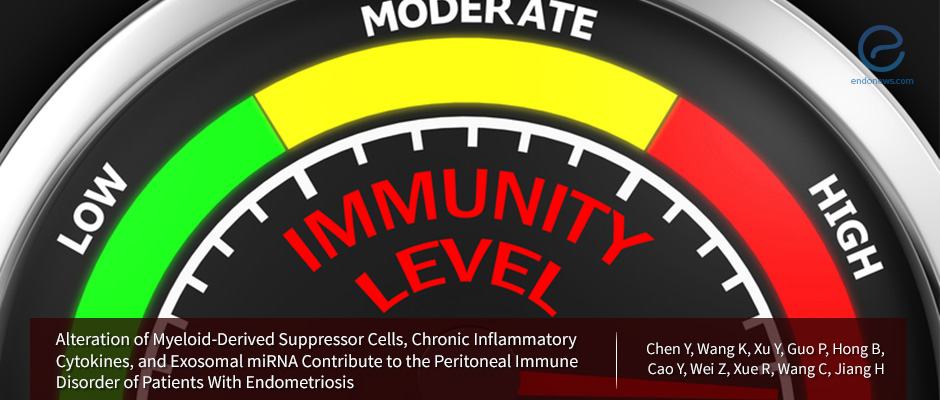Immunologic Disorder in the Progression of Endometriosis
Mar 19, 2019
What’s happening in the peritoneal microenvironment of the endometriosis patients?
Key Points
Highlight:
- Dr. Jiang group from China revealed a complex relation between immunosuppressive condition, chronic inflammation, miRNAs, and the disease progression in patients with endometriosis.
Background:
- Endometriosis becomes increasingly a health-social problem, but definite diagnostic biomarkers and more effective treatments are still missing.
- Peritoneal microenvironment, especially the immunological microenvironment, is becoming important in endometriosis research.
- Recent studies showed that the long-term existence of chronic inflammatory conditions in the microenvironment can enhance endometriosis progression.
- Various other reports have shown that miRNAs engaged in the pathogenesis of endometriosis, but no research that studies the correlation between miRNAs, chronic inflammation, alteration of immune cells, and endometriosis.
- In this study, Dr. Jiang group from China investigated the potential relationship and their roles in the initiation and progression of endometriosis.
Key points:
- Patients with advanced endometriosis showed an elevated frequency of monocytic- myeloid-derived suppressor cells (MDSCs) and regulatory T cells (Tregs) in peritoneal fluid samples as compared to that in the control group.
- Consistently, those late-stage patients showed the significantly increased immunosuppressive function of MDSCs and the level of cytokines.
- miRNAs profiling analysis found that several miRNAs, such as miR-451a, miR-486-5p and miR-130-5p, are significantly upregulated in the advanced endometriosis patients.
Conclusions:
- Monocytic-MDSCs, inflammatory cytokines, and miRNA seem to be involved in the progression of endometriosis.
- The underlying molecular relationship between Mo-MDSCs, cytokines, and miRNA in the endometriosis requires further research.
Lay Summary
Endometriosis becomes increasingly a health-social problem. However, definite diagnostic biomarkers and more effective treatments for endometriosis are still missing to this day.
Many researchers focus on the peritoneal microenvironment of patients with endometriosis, especially the immunological microenvironment. Recently, Jørgensen et al studied peritoneal cytokine profiles in the endometriosis patients and found that the long-term existence of chronic inflammatory conditions in the microenvironment can induce accumulation of immunosuppressive cells and enhance the endometriosis progression.
On the other hand, various reports have shown that miRNAs engaged in the pathogenesis of endometriosis. However, till now there is no research that studies the correlation between miRNAs, chronic inflammation, alteration of immune cells, and endometriosis.
Therefore, in this study, Dr. Jiang group from China investigated the potential relationship between the immunological alteration, miRNAs, and chronic inflammation and their roles in the initiation and progression of endometriosis. The results are published in the SAGE Journal "Reproductive Sciences".
Myeloid-derived suppressor cells (MDSCs) and regulatory T cells (Tregs) play important roles in the immunosuppressive microenvironment. Patients with advanced endometriosis showed an elevated frequency of monocytic-MDSCs and Tregs in peritoneal fluid samples as compared to that in the control group. Consistently, those patients with late-stage showed the significantly increased immunosuppressive function of MDSCs and the level of cytokines. Profiling of miRNAs showed differential expression between patients with advanced endometriosis and control. Several miRNAs, such as miR-451a, miR-486-5p and miR-130-5p, were significantly upregulated in the advanced endometriosis patients.
In conclusion, Dr. Jiang group revealed a complex relation between immunosuppressive condition, chronic inflammation, miRNAs, and the disease progression in patients with endometriosis. However, the underlying molecular relationship between Mo-MDSCs, cytokines, and miRNA in the endometriosis requires further research.
Research Source: https://www.ncbi.nlm.nih.gov/pubmed/?term=30453861
Immunosuppression Endometriosis Inflammation Exosomal miRNA Peritoneal fluid

